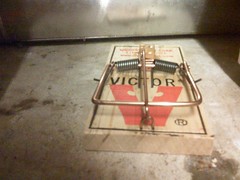On the Flop
 Image by slworking2 via Flickr
Image by slworking2 via Flickr
One play that you should consider is to check when you flop top pair heads-up and act last. While it is risky, the reward can be a bigger win. Of course, this is a play that should be limited to flops that are not coordinated since giving a free card could cost you the pot.
And the play works even better when you are up against an aggressive player.
Example:
You have A♠-J♥. It is the middle of the tournament. You have $38,000. The blinds are $400-$800. A player in the middle position, with $45,000, raises to $4,000. You call on the cut-off. Everyone folds. It’s heads-up. The pot is $9,200.
The flop is A♣-8♦-6♥. Your opponent checks his hand. What should you do?
Check as well. It is true that your opponent could have a straight draw, but take a chance.
In fact, your opponent’s big pre-flop raise may indicate that he has a medium pocket pair that he was trying to protect. So if he has pocket Jack’s, your bet on the flop will get him to fold. However, the check may give him the green light to make a play for the pot on the turn.
On the Turn
If you've been watching the WSOP, you will also notice that a lot of players with top pair bet the flop and check the turn. So in the above example, you would bet when your opponent checks. Since your opponent may think you are trying to take the pot away from him, he calls with those pocket Jacks. He doesn't want to laydown 2nd pair in case you are bluffing.
When the turn is a another rag, he will check to you. If you bet, he will surely fold. If you check behind him, you are going to be paid off on the river. That is because he will either bet into you thinking you are weak. Or, if he checks, he will call your river bet for the same reason.
I realize that this is not going by the book. However it is a play you should consider. Try the check on the turn. It will work. I've done it. The key is not to become addicted to it, or you will start to get too fancy in your play.
Suggestion:
Just remember that these trap plays are against a single opponent, and sometimes they come back to bite you when you give a free card. However you will find that as your opponents have gotten more aggressive, you have opportunities to trap them with top pair by the power of a check.








No comments:
Post a Comment